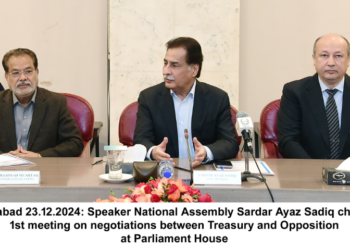Islamabad – September 6, 2024 – In a landmark judgment, the Supreme Court of Pakistan has reversed its earlier decision to annul the amendments to the National Accountability Bureau (NAB) law. A five-member bench, led by Chief Justice Qazi Faez Isa, unanimously accepted the intra-court appeals filed by the federal government and other petitioners, effectively reinstating the NAB amendments.
The court delivered its 5-0 verdict, with the bench comprising Justice Aminuddin Khan, Justice Jamal Khan Mandokhail, Justice Athar Minallah, and Justice Hassan Azhar Rizvi.
The ruling clarified that Pakistan Tehreek-e-Insaf (PTI) founder Imran Khan failed to prove that the amendments were unconstitutional. The judgment comes three months after the case was reserved for a decision, following appeals against the court’s earlier ruling, which had struck down the amendments.
The bench stated that the prior decision by a three-member bench did not sufficiently demonstrate that the amendments conflicted with the Constitution. After hearing the appeals, the five-member larger bench had reserved its decision on June 6, 2024.
Background on the NAB Amendments Case
The amendments were originally introduced during the tenure of the Pakistan Democratic Movement (PDM) government and were challenged by Imran Khan. On September 15, 2023, the Supreme Court invalidated nine of the ten amendments. This ruling was contested by the federal and provincial governments through intra-court appeals.
Key revisions in the NAB amendments excluded certain cases from NAB’s jurisdiction, with the changes backdated to the enactment of the National Accountability Ordinance of 1999. The amendments limited NAB’s authority to investigate cases involving amounts less than Rs. 500 million, allowed it to investigate fraud cases only when the number of victims exceeded 100, and extended the maximum remand period from 14 to 30 days.
Furthermore, the amendments restricted NAB from intervening in federal, provincial, or local tax matters and removed regulatory bodies from its oversight.
This Supreme Court ruling now restores the amendments, representing a pivotal moment for Pakistan’s accountability framework.









